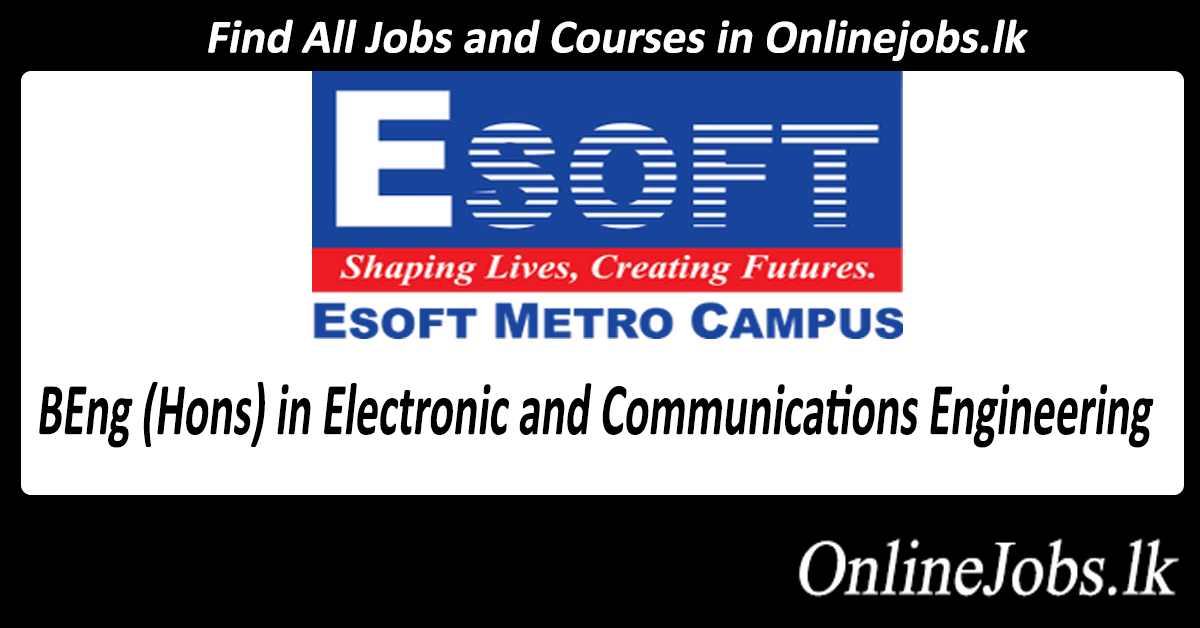ESOFT College of Engineering & Technology, delivers BEng (Hons) in Electronic and Communications Engineering Top up degree of London Metropolitan University,UK. This Top up degree aims to provide you with expertise in the fields of electronic and communications engineering. It emphasizes all aspects of electronic design, development and maintenance along with those of communications systems. Students with NDT, NDES, SLIATE, City & Guilds (Advanced Diploma), HND or equivalent qualification can join the final year of this programme.(Top-up Degree).
Our program is designed with a strong electronics component to better suit modern-day electrical engineers, this sufficiently covers the important areas such as computing, communications, signal processing, instrumentation, automatic controls, and projects/business management. Because electrical and electronic circuits are present almost in all the practical systems today, electrical and electronic engineers enjoy employment opportunities in a much broader range of industries. They find employment opportunities in the large industries such as electrical power, energy, manufacturing, automotive, lighting and household appliances, consumer electronics, entertainment, and telecommunication.
More information:
http://www.londonmet.ac.uk/courses/undergraduate/2016/electronic-and-communications-engineering—beng-hons/
BEng (Hons) Electronics and Communications Engineering Top up degree program has been designed for students who have successfully completed BTEC HND in Electronic and Communications Engineering or equivalent (e.g. NDT, NDES, SLIATE) to enroll in to the final year of BEng (Hons) Electronic and Communications Engineering at London Metropolitan University, UK.Please note: each application is assessed on an individual basis and may be subject to requirements, such as undertaking short course(s) and/or English language qualification(s).
The program is structured with four taught modules and a research project. Please note that this is an indicative list of modules and is not intended as a definitive list.
FC6P01 – Project
The module enables the students to demonstrate their acquired knowledge and skills through a systematic and creative investigation of a project work, either individually or as a part of group, in accordance with their course requirements. The topic of investigation will cover a broad spectrum of various analysis and techniques and will lead to a comprehensive and concise academic/industry – related report. Students will be assisted in exploring areas that may be unfamiliar to them and encouraged to develop innovative ideas and techniques. Students will be able to choose a project that may require the solution to a specific problem, creation of an artefact in a real- world environment or an investigation of innovative ideas and techniques related to an area within their field of study. Collaboration with outside agencies and projects with industrial, business or research partners/ sponsors will be encouraged.
CT6001 – Microwave & Optical Fiber Communications
This module introduces students to microwave and optoelectronic technologies. It covers the key features of modern microwave wireless system, their operations and design requirements. Also cover the basic concepts of optoelectronics. Students are shown how various op to electronic devices are currently used in laser line-of-sight and fiber optic communication systems. The module develops analytical and design knowledge, and provides experience of team working through a group work.
CT6003 – DSP Applications & Control Systems
This module provides students with a comprehensive knowledge of a range of digital signal processing techniques including z-transformation, Discrete Fourier Transform, Power Spectral
Density and their applications in a variety of scientific fields such as a Sonar and Radar, Telecommunications, Medical, Geology and Astronomy. It also provides fundamentals of control
systems engineering concepts and develops knowledge and understanding of the various feedback
control systems leading to the design of such systems mainly in continuous time but also touches upon discrete – time systems.
CT6053 – Digital Systems Applications
This module extends the digital design techniques learnt at intermediate level to the use of Application Specific Integrated Circuits. It provides an extensive treatment of the use of Virtual Hardware Description Language using the industry’s standard (Xilinx and its associated hardware)
CT6055 – Data Acquisition & Interfacing
This module reviews a selection of sensors and transducers and the signal conditioning necessary for including these in a data acquisition system. It provides a good grounding on analogue to digital and digital to analogue conversion principles and their practical applications.

